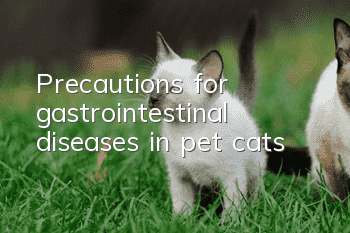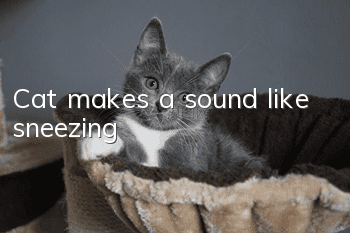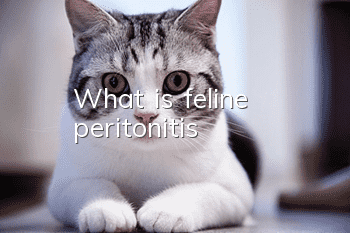Precautions for gastrointestinal diseases in pet cats

Gastrointestinal problems are one of our common cat diseases. For example, we often encounter vomiting and diarrhea in cats. It may be a gastrointestinal problem. The cat’s intestines and stomach are related to the digestive system and the body’s nutrient absorption and metabolism, so Problems should not be taken lightly. The gastrointestinal tract generally needs conditioning. If you don’t pay attention to it at the beginning, it will be more troublesome to treat it later.
Gastrointestinal diseases have many clinical symptoms, and some of them have nothing to do with the digestive system, such as skin diseases caused by food allergies. However, more than 90% of gastrointestinal diseases will cause vomiting and diarrhea.
Here we only discuss the problem of pet gastrointestinal diseases based on the two symptoms of vomiting and diarrhea. To put it simply. A simple gastric disease only has vomiting symptoms, and a simple intestinal disease only has diarrhea symptoms. The two symptoms of vomiting and diarrhea will only occur when the gastrointestinal disease is combined. Let’s talk about vomiting first. Vomiting should be distinguished by coughing and drooling. Many people can't tell whether their baby is coughing, drooling, or vomiting. Generally speaking, the occurrence of vomiting requires a continuous movement. First he arched his back, then his abdominal muscles wriggled forward, and finally he opened his mouth to spit out vomit. Vomitus may be hair balls (very common in cats), parasites (common in young animals), foreign bodies (dogs often eat randomly), and the most common is various types of chyme (food clumps with varying degrees of digestion). Usually the vomitus is white and frothy. When it is yellow, it may be mixed with bile. If it is red, it may be bleeding from the stomach. The worse the smell of vomit is, the more severe the damage to the stomach. For pet owners, vomiting must be a cause for concern. Because frequent and large amounts of vomiting will cause the pet's body to lose water and electrolytes instantly, ranging from depression to shock and death.
When a cat vomits, the owner should pay attention to observation. If the cat does not show any obvious abnormalities after vomiting, you can rest assured. If the cat shows extreme lethargy after vomiting and does not like to eat or exercise, he should seek medical advice in time. Contact your veterinarian for treatment.
If the cat suddenly eats a lot, and then finds a darker corner to start vomiting, vomits out all the food it has eaten, and then eats it again, repeating this one or more times, it will be full of life again. It is caused by hair ball disease. Generally, if the owner gives the cat more water, it will be fine.
Diarrhea is simpler to explain than vomiting. To put it crudely, it means loose stools, which are different forms of loose stools. Its complicated side is generally considered by hospital laboratory technicians, so I won’t go into details here. Under normal circumstances, stool should be moderately soft and hard. Too dry and too hard may indicate constipation or megacolon; too thin and too soft may indicate parasites, infectious diseases or indigestion. We can know many pet health problems by observing their stool. Dark-brown stool is seen in bleeding in the upper part of the digestive tract (such as stomach, duodenum); blood clots and blood streaks in the stool are seen in bleeding in the lower part of the digestive tract (colon, rectum); yellow-green stool is seen in jaundice caused by Leptospira; stoolSour smell is seen in general indigestion; fecal odor is seen in severe gastroenteritis; pus and mucous membranes in the stool are seen in purulent gastroenteritis. Of course, stool contains far more information than this, but if you want to know more in-depth information, you can only ask a laboratory technician to do a stool test for you.
In addition, when pet cats lack the digestive enzymes to digest lactose, they may suffer from mild diarrhea if they drink milk by mistake. Therefore, special milk powder should be prepared for cats to avoid diarrhea. At the same time, gastroenteritis is also the main cause of diarrhea in cats. When a cat has persistent diarrhea, vomiting, rapid weight loss, and symptoms of dehydration, it can be proven that the cat has gastroenteritis.
Cats of all ages can develop gastroenteritis. Kittens are more susceptible to gastroenteritis because their stomachs are very shallow and they are not very good at controlling their food intake. If they are not fed properly, they can easily develop gastroenteritis. The treatment of gastroenteritis is to remove the cause, reduce inflammation, stop diarrhea, and replenish fluids. Corresponding treatment measures should be taken according to the cause of the disease: for gastroenteritis caused by overeating, feeding should be stopped for one day to ensure adequate drinking water. During the treatment, the patient should cooperate with Good nursing work, such as providing small amounts of delicious, easy-to-digest liquid food.
It is important to emphasize here that it is not recommended to feed cats milk, especially young cats, because many cats are lactose intolerant. They do not have lactose enzyme, so they cannot digest the lactose in milk, so they will drink milk after drinking milk. Soft stools or diarrhea may occur when the child is young, and may even lead to death. If the cat has not passed the weaning period, it is best to feed it special milk powder for pets.
Typically, issues to consider when vomiting and diarrhea occur
Generally, when we find that a pet has vomiting or diarrhea, the first question we should consider is whether our pet has been dewormed and vaccinated. Under normal circumstances, pets need to be vaccinated and dewormed internally and externally every year. Infectious diseases caused by various viruses and parasitic diseases caused by various parasites can cause vomiting or diarrhea. If it has not been done or you are not sure whether it has been immunized and dewormed, it is best to go to the pet hospital for relevant examinations. Of course, we don’t rule out situations where things will get better without checking, but I still don’t recommend taking risks.
After ruling out parasites and immune problems, the second thing to consider is the pet’s eating habits. Taking cats as an example, it depends on whether they have the habit of licking their fur and whether they take hair removal cream or related products. Take a dog as an example. Does it have the habit of picking up things randomly? Do you usually have vomiting or diarrhea from time to time? Do you eat irregularly and often overeat? Do you eat a lot of food and eat everything? Is the food you have eaten recently expired? All related problems like these may cause Gastroenteritis. Maybe these are just minor problems in daily life. Your baby is very strong and has never had any problems, but in the long run it will inevitably lead to some chronic gastrointestinal diseases. These diseases usually only involve mild vomiting or diarrhea, but are difficult to cure.
How do you usually regulate your cat’s intestines and stomach?
First, take care of those with sensitive stomachsCats should be provided with a single diet whenever possible. Many people think that cats should eat more delicious supplements if they are thin and small. In fact, this is not the case. The cat’s intestines and stomach are different from the human intestines. If a cat with poor gastrointestinal absorption function eats some oily and watery food, it will increase the burden on the gastrointestinal tract. Therefore, a cat food that is nutritious and easy to absorb is the best choice for cats. Recommended cat food: Royal K36, Development Bao, and Craving Complete Cat Food. In addition, do not change cat food frequently.
Secondly, you must control your cat’s food intake. Cats with sensitive stomachs have poor digestion but often have a good appetite. If the cat's food intake is not controlled, the cat will eat too much food and be unable to absorb it, which increases the burden on the gastrointestinal tract. Therefore, cats with sensitive intestinal cat food and stomachs should be fed regularly and quantitatively. Generally, they can be fed four times a day, breakfast, lunch, and dinner plus a midnight snack. The total amount of food should be controlled to 0.1kg of cat food per kilogram of body weight. Cats have better appetite and absorption in the early morning, so they can feed more at night.
Third, you should also pay attention to drinking water. It is not recommended to give cats mineral water, purified water, etc. Cats drinking mineral water can easily lead to urinary tract stones. It is best to give your cat boiled water, but be careful to keep the water clean and fresh.
Fourth, you can give your cat some nutritional products, such as nutritional paste, to ensure that the cat gets the nutrients it needs to grow.
Finally, if the cat has severe diarrhea, you can give the cat some digestive drugs such as lactase or Jianweixiaoshi tablets to adjust the cat's gastrointestinal health to ensure the cat's gastrointestinal health.
- Why do cats like to stay in pens?
- Why can pet cats climb high?
- The cat keeps panting and has shortness of breath.
- What do cats need to prepare for giving birth?
- What causes cats to fart?
- How to train Bengal cats? What are your opinions?
- Why does a cat's hind legs feel weak and cramped?
- How to buy a pure Persian cat? How to buy a pure Persian cat!
- Why can’t cats eat protein?
- Why doesn't the cat poop?



